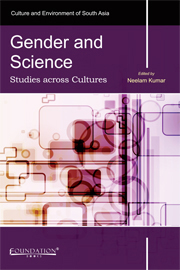Book contents
- Frontmatter
- Contents
- List of Contributors
- Acknowledgements
- Introduction: Reflections and Realities across Cultures
- Section I Approaches and Perspectives
- 1 Getting More Women into Science: Knowledge Issues
- 2 Gender Imbalance in Science: Cultural Similarities and Diferences
- 3 Gender and Technology
- 4 Gender, Science, and the Psychology of Science
- 5 Women and Minorities in Science: Discrimination and the Solution
- Section II Illustrative Examples
- Conclusion: The Persistent Patterns!
- Bibliography
- Index
3 - Gender and Technology
from Section I - Approaches and Perspectives
Published online by Cambridge University Press: 05 May 2013
- Frontmatter
- Contents
- List of Contributors
- Acknowledgements
- Introduction: Reflections and Realities across Cultures
- Section I Approaches and Perspectives
- 1 Getting More Women into Science: Knowledge Issues
- 2 Gender Imbalance in Science: Cultural Similarities and Diferences
- 3 Gender and Technology
- 4 Gender, Science, and the Psychology of Science
- 5 Women and Minorities in Science: Discrimination and the Solution
- Section II Illustrative Examples
- Conclusion: The Persistent Patterns!
- Bibliography
- Index
Summary
One fundamental way in which gender is expressed in any society is through technology. Technical skills and domains of expertise are divided between and within the sexes, shaping masculinities and femininities – maybe the iconic womanly skill is basket making, whereas men should excel at hunting (MacKenzie, 1991); or boys must learn to clean their fathers' tools to get a feel for grease before they are taught to use them (Mellström, 2004); or poor women raise silkworms and sell the cocoons to rich households where the mistress organises the tasks of reeling, spinning, and weaving among her servants (Bray, 1997); or boys huddle around the computer screen, practicing hacking skills, while girls develop new communication codes using emoticons (Lægran, 2003b; Miller, 2004). In the contemporary world, or at any rate in the Western nations which pioneered industrialisation and have thus been able to dominate worldwide production of material and intellectual goods, services, and desires, for so long, technology is firmly coded male. Men are viewed as having a natural affinity with technology, whereas women supposedly fear or dislike it. Men actively engage with machines – making, using, tinkering with, and loving them. Women may have to use machines, in the workplace or in the home, but they neither love nor seek to understand them – they are considered passive beneficiaries of the inventive flame. The modernist association of technology with masculinity translates into everyday experiences of gender, historical narratives, employment practices, education, the design of new technologies, and the distribution of power across a global society in which technology is seen as the driving force of progress.
- Type
- Chapter
- Information
- Gender and ScienceStudies across Cultures, pp. 37 - 60Publisher: Foundation BooksPrint publication year: 2012
- 2
- Cited by



